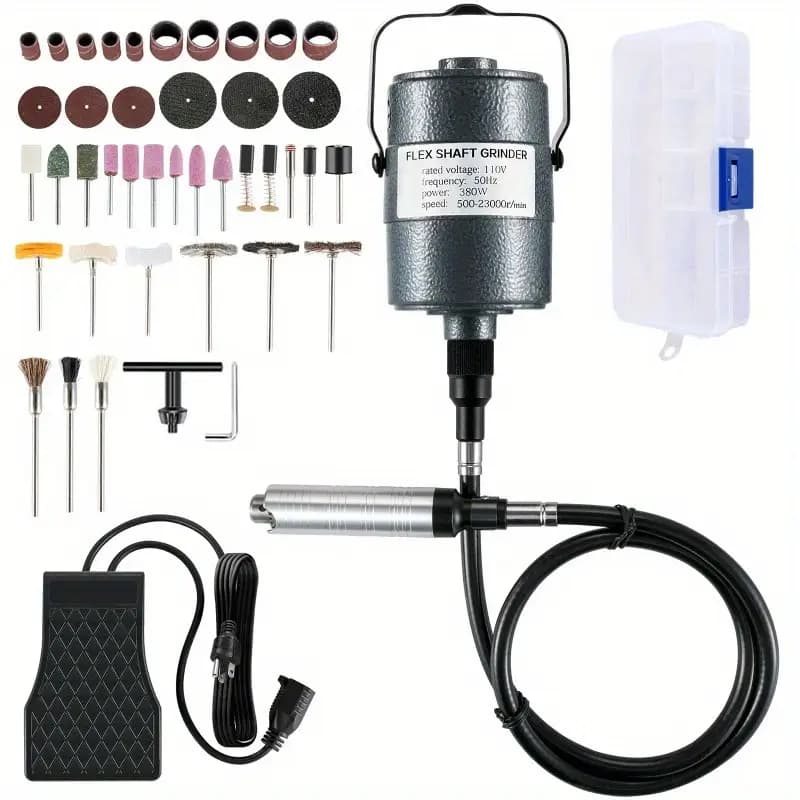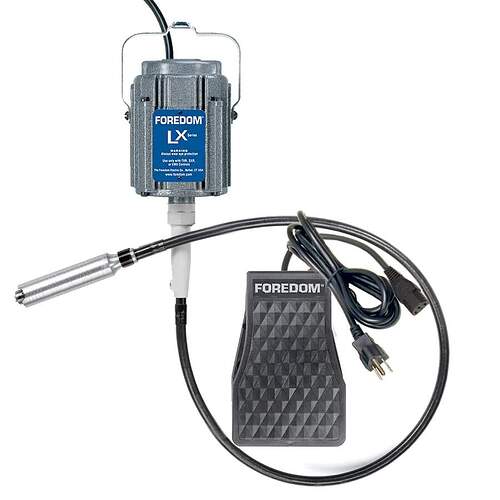After some 40-odd years my Dremel finally bit the dust (literally!). That model has (had) replaceable chucks (collet?) for large diameter shaft tools, as well as chucks for fine drill bits. I was checking out the Dremel, and Dremel clones, on Amazon and they seem to have only one fixed chuck which will only accept large shafts. Do the chucks on newer models go from drill bit size all the way to to the large shaft size? All I need is a replaceable motor-tool as I still have all (or most) of the original accessories, including the different chucks. Don’t want a cordless as I also have a separate speed-control box for the old single speed tool. Is there a model number that fulfills these requirements?
![]()
![]()
Have you considered PROXXON tools? I do not know for certain if Dremel bits and bobs are compatible, but one would think they are.
Which type of Dremel? Photo?
What broke? How did it break?
My old Dremel has a threaded shaft so any chuck with those threads would work.
There could be an issue with metric vs imperial (threads et.c.)
Good point.
Proxxon seems to be metric.
Dremel seems to go both ways.
“Seems” - I’m hedging my bets. ![]()
Mine has two collet sizes, and is almost as old as I am. It speaks volumes for its robust design, as I have put it throught the paces for many decades now. You may be able to find an adaptor for the collet,
My son ![]() got me a surprise gift of a Dremel 4300 from Amazon. It’s a variable speed, but won’t work when plugged into my speed control - it appears that I won’t need the speed control anymore, anyway. The collet is not inter-changeable, but it does accept the tiniest drill bits up to the larger tools. Looks like I’m back in business!
got me a surprise gift of a Dremel 4300 from Amazon. It’s a variable speed, but won’t work when plugged into my speed control - it appears that I won’t need the speed control anymore, anyway. The collet is not inter-changeable, but it does accept the tiniest drill bits up to the larger tools. Looks like I’m back in business! ![]()
![]()
![]()
I see speed control. Any luck on getting RPMs in low hundreds, 150-300 specifically?
Unloaded RPM’s between 5000 and 35000.
Dremels are high powered and high speed.
Where/When/How would you use the low RPMs?
I use low RPM’s to spin roadwheels SLOWLY when painting them
so I got myself a cheap and weak mini-drill that I can adjust to low RPM
and then brake the rest using the thumb.
Proxxon drills can be adjusted to low RPMs but they are not in the cheap segment of the market. At the very low RPM’s most of these tools get twitchy (depends on how sofisticated the electronics are) so I keep them as slow as possible but where they are not twitching and then use the skin-brake to adjust. Weak tool → not dangerous to use thumb for braking.
I would never use skin-braking on a Dremel …
Using a steel cutter to remove large resin casting blocks. A slower speed creates resin chips, not dust.
Low RPM will not melt the plastic.
300-150 RPM for styrene and sometimes resin. Styrene is a super cooled material, goes from solid to vapor at certain temps. 3500 RPM will cake a sanding drum instaneously. (I paraphrase). Low RPM I can sand, drill and shape styren easily. Tools? See next reply for jewelers rotary tool. But I have no foot pedal RPM control so back to searching for a dial control. Also pondering a 120V AC speed controller. I will assume similar device available on your side in 220V, but is your service AC?
This is a good suggestion and I am after slower RPM. Still a good tool to have.
As I thought. I can get styrene to start sticking to the jigsaw blade (muscle powered) …
For sanding you need the torque at low RPM
OR
a weak tool that will get slowed down by the resistance.
Maybe this one (5000 RPM at 12 V DC) but maybe using a lower voltage (your own transformer or battery) could get you a lower RPM (low torque, will slow down when it meets resistance)
https://www.proxxon.com/en/micromot/28500.php
Check Amazon or ebay for the El Cheapo tools with low torque.
There is also the expensive Dremel tool,
Dremel Fortiflex 9100-21
They claim 0 to 23000 RPM, I haven’t tested but there are reviews on the internet
Sweden runs 230 V, 50 Hz AC
Unless it is 0 to 5000, you will lose power/ torque at low RPM using a 0-23000 tool.
This is a 0 to 5000 unit.
Exactly. This is the range. While Dremel appears a competive alternative to Foredom, this caused me to revisit Foredom to discover a table top product with built in speed control eliminating the foot pedal. Very tempting alternative to running a flex shaft off the drill press, that having variable speed control, too.
In the end I basically assemble and customize kits and have fun at the same time. I do set a budget, necessary with Foredom, plus the bank needs to be open for the kits and supplies.
Great feedback on this topic, Tks!

